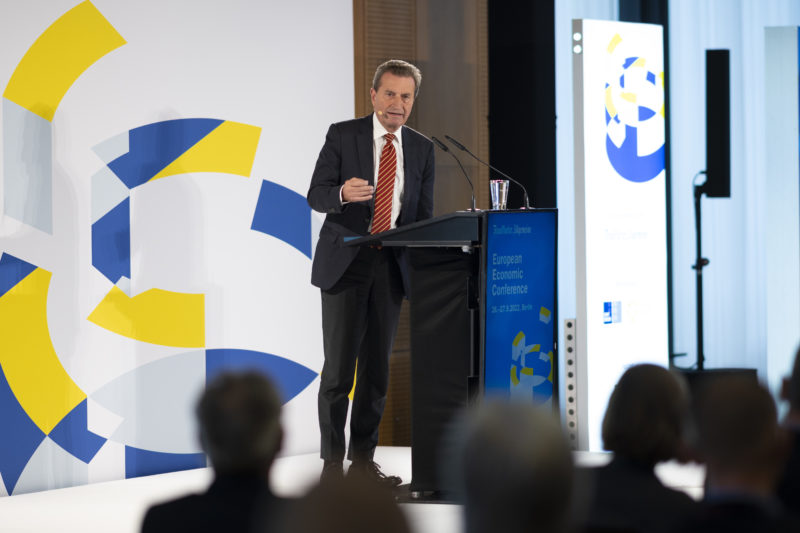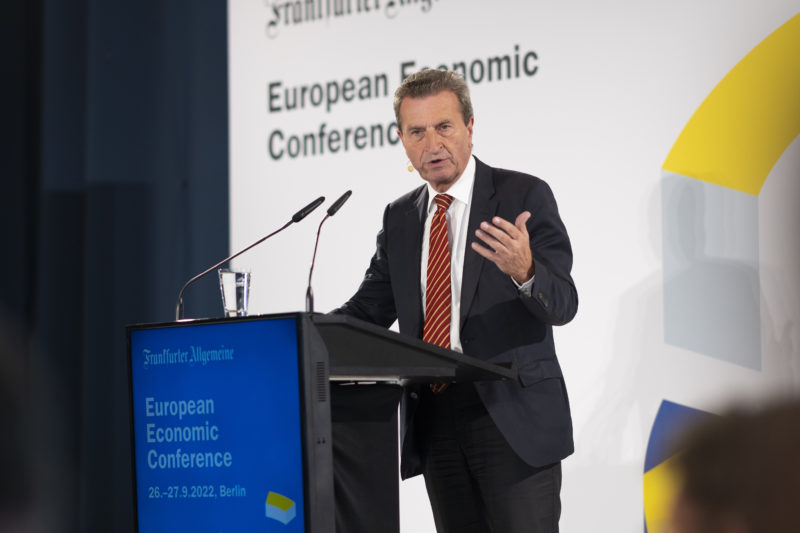Opening keynote by Günther H. Oettinger, President of United Europe, at the first European Economic Conference (EEC) in partnership with the F.A.Z. and the ESMT in Berlin.
“Is the European Union a guarantor of prosperity with an ecological, viable and sustainable economy? Not anymore! We have been, once, and Germany was a founding member. Think about Robert Schuman, Jean Monet, the Coal and Steel Community, the Single Market, and the EU enlargement. And today? Europe is in crisis. Europe is the demoted continent. Germany is in the middle of a recession with the highest inflation ever recorded in history.
We have an ECB which, in my opinion, has far too late realised, that it has one main task, namely monetary stability. Instead, the ECB flooded the market. The war came along unpredictably. But the flooded market and the low-interest rate policy – both give pause for thought. Normally, interest rates would have to be lowered now if they had been raised before! The European economy has since long ceased to be where we still think it is. Of the 100 largest companies in the world, the most important European company is the Swiss corporation Nestle – just outside the European Union. The German corporation’s SAP or Linde is somewhere between 100th and 120th place.
Europe – a guarantor? As far as I know, not anymore. We need a new success story for Germany and for the European Union. We need to build on innovation, growth, on a strategy that creates jobs and that helps to finance all this without permanently increasing the debt burden.
I’m not a mathematician, but I know the math doesn’t add up anymore. Our social systems are no longer sustainable. We urgently need a plan in Germany and Europe that is innovative and can also bring the continent back to the forefront in terms of economic policy and competitiveness. First and foremost, this has to do with education and lifelong training until the age of 70. Retirement at 70 should be the headline for the next decade. That, too, is a taboo no one wants to hear.
Another critical point is the topic of infrastructure and investments in rail, road, waterway, airway, and digital roads and all this has to happen in a coordinated way across borders.
Whose infrastructure is ready? Switzerland’s – with the highest costs per capita. Whose is not ready? The Germany’s!
The Germans are blocked in the realisation of infrastructure. This is evident in all the projects that are currently underway. Now we finally want to speed up the approval of two floating LNG terminals. We need that for every infrastructure of public interest. A speeding up of the legal process, a shortening of the procedures!
The guarantor of prosperity in the European Union is the single market. 430 million people, one standard, no borders, and freedom of movement for goods, commodities, and services. Germany is ultimately the pioneer when it comes to completing the internal market. The completion of the internal market is an important factor that costs nothing, only the goodwill of the Council, Parliament and Commission. Once we have a completed internal market, it is a question of opening up to the outside world with the implementation of various trade agreements. We have achieved a lot in recent years: agreements with Japan, South Korea, and Australia. But a lot is still on the table, many trade agreements have not yet been ratified, and Mercosur is blocked. Uruguay, Argentina, Paraguay and Brazil are growth countries. If Europe does not organise trade transatlantically, it will be organised pacifically, then this region will turn away towards Asia. RCEP should have been a wake-up call. 14 Asian countries, all not in friendship with China, some of them bullied by China like Australia or Japan, have concluded an agreement that means 30% of the world’s value-added volume. We must conclude trade agreements with countries in Asia and South America and finally understand that they do not tick 100% as we do. We will have to build massive agreements with the US. We have to move now. All these agreements must have priority in Brussels, but unfortunately also in the national parliaments. First and foremost in the German Bundestag.

Jean Claude Junckers coined the phrase ”Capability of World Politics‘ at the 54th Security Conference in Munich. Europe must become capable of global politics. Europe is not yet capable of being a decisive player on the world stage. Europe could be if we would act with one voice, speak with one voice. When it comes to energy policy, I would like to see not national ministers travelling to Qatar, Norway, and Algeria, but a European delegation. One Commissioner, and two ministers on a European scale. If we want to complete the internal energy market on a European scale, it makes no sense for 27 dwarfs to turn up in Qatar, curtsey and disappear. This means: divide et impera, divide and rule. Europe must no longer allow itself to be divided and dominated. It must present a united front to the outside world. Then we would finally have weight in this battle of systems between the USA, our partner and Asia.
A final, very topical thought. In the next few weeks, critical central decisions of interest to Europe will take place. On 16 October, the CPC Party Congress begins. There will be weeks of discussion, and in the end, Xi Jinping will be elected for another five years or for life. An autocrat regains power.
On 8 November there are mid-term elections in the USA. Then it will be decided whether Joe Biden, a friend of Europe and Germany, remains capable of acting in Congress in both chambers or is already a “lame duck”.
Then everyone will fly to Bali, where the G20, the conference of the world’s 20 powerful heads of state and government, will take place on 15 and 16 November. Many Europeans will be there. I would hope, and hope dies last, that Europe will speak with one voice after all. Italy, France, Germany, the UK, and the European Commission, coordinated with Washington DC, but not with orders from Washington DC. And with a clear message to Xi Jinping.
For never have we had such an abundance of crises as at present. We are not defenseless, but we are all very concerned about whether the European Union will hold in its unity. In addition to Russia’s war against Ukraine, there is the threat of an escalation of China against Taiwan. Actually, we democrats should know that dictators can be taken at their word. If our grandparents had read “Mein Kampf”, we would have known Hitler and his true intentions earlier.
If we had taken Putin’s talk seriously in 2001, we would have known more about Crimea, the Donbas and the terrible war that Putin is now to blame for. Xi Jinping is also talking straight. He says he wants to take Taiwan in this decade. Are we taking him seriously? What will happen if Xi Jinping turns Taiwan into a West Berlin, i.e. cuts it off or, even worse, bombards it with missiles? Then the Americans will have to decide whether Biden’s word is good. Then aircraft carriers would land there and the Americans would invite us to join in. But how is that supposed to work if the Bundeswehr helicopters fly at most as far as Warsaw? Then the Americans would invite us to adopt sanctions. And it’s clear that sanctions like those against Russia do have an effect. And China is dependent on technology from Europe and the USA. But the sanctions don’t affect Bulgaria, Estonia or Malta. They hit the German business model.
We must have an interest in preventing a China-Taiwan escalation. We must have an interest in Xi Jinping not stopping his economic development like Putin and gaining land as a tsar, but in Xi Jinping giving priority to the prosperity and well-being of his people. For this, he needs the world. For this, he needs technologies from Europe and the USA for a limited period of time.
Bali is the right place to make this clear with one voice. And Bali is the right time for this. Only Europe has the ability to maintain our prosperity internally, in the internal market, for research, for freedom of movement, and for our image of humanity. And Europe can gain authority externally as a united whole – something that is not possible for 27 individual member states.
Please find under the following link all the contributions of the European Future Conference.
We would like to thank Mr Günther H. Oettinger, Mr Gerald Braunberger, the publisher of the F.A.Z., the team of the F.A.Z conferences and the colleagues of the ESMT for the joint organisation of the first EEC in Berlin on 26th and 27th of September in Berlin,



